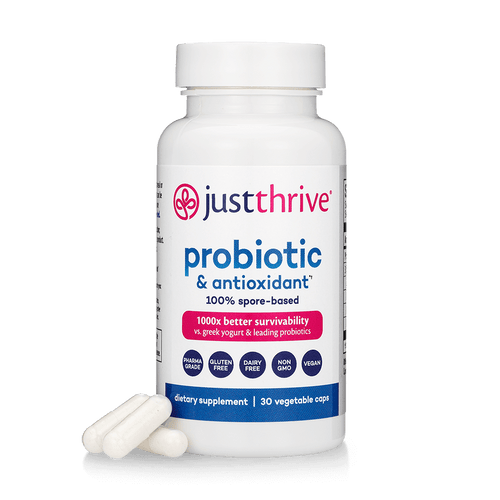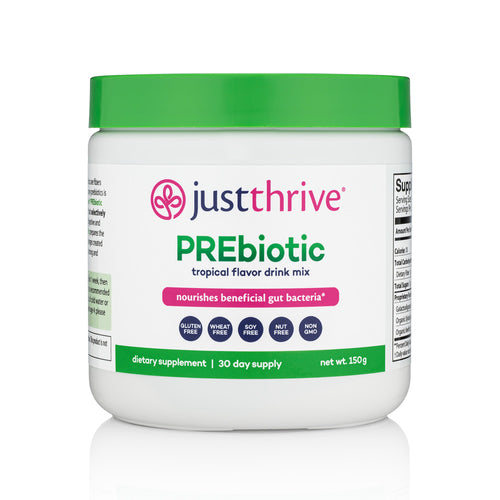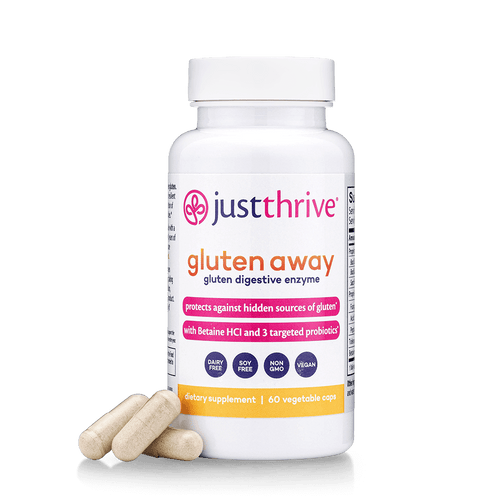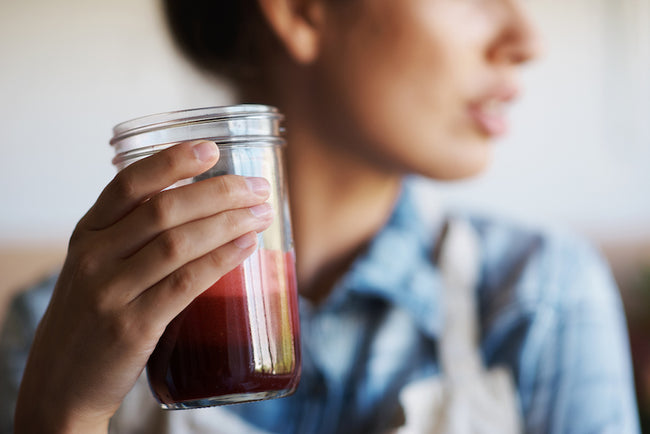When your gut feels bad – bloated, gassy, painful – you want to feel better as fast as you can. 50 years ago, you might have reached out to your family practitioner or a trusted friend to find a solution. A decade ago, you might have consulted Doctor Google for a quicker way to find relief. Nowadays, many people are turning to influencer videos on TikTok and Instagram to get their gut health advice.
Unfortunately, a vast majority of the advice you’ll find on social media is just plain wrong… Some of it may even be harmful to your health.
Of course – We all want digestive comfort, and in a perfect world, we’d all be able to snap our fingers to eliminate bloat and carve out six pack abs.
And while there ARE clinically proven ways to get your gut into healthy balance, so you can take control of your tummy and enjoy digestive excellence… Now there’s also an ever-emerging body of advice on social media that you DEFINITELY want to steer clear of.
See below for the biggest offenders…
5 Gut Trends You DON’T Want to Follow
You can find thousands of videos on social media promising “proven” hacks to improve your gut health in no time at all. Many have gone viral… but going viral isn’t always so great for the bacteria in your gut microbiome. Here are five things that social media is getting very wrong about gut health.
1. A flat stomach means a healthy gutInstagram and TikTok influencers promise that a healthy gut means a flat stomach, showing heavily bloated before and sculpted abs after photos. And while good gut health will reduce bloating, that’s far from the only issue that comes with poor gut health.
According to studies, you can have a flat stomach and an extremely unhealthy gut.(1) In fact, an unhealthy gut can lead to many non-digestive issues like autoimmune conditions, thyroid issues, rheumatoid arthritis, mood changes, and even diabetes.(2)

2. Apple cider vinegar shots cure all your gut problems
Apple cider vinegar – in moderation – does offer some health benefits. It contains both helpful probiotics and antioxidants, which your body needs to stay healthy.
But only relying on shots of straight apple cider vinegar (ACV) to fix an unhealthy gut is a recipe for trouble. Worse, frequent daily shots of ACV can potentially damage your esophagus or eat away at the enamel on your teeth.(3)
3. Drinking olive oil fixes bloating
One popular video, with millions of views, claims that drinking olive oil gets rid of bloating. Pure olive oil from a quality source does deliver lots of health benefits… But drinking full glasses of it can bring on its own set of gut problems.
It can irritate your stomach, and potentially cause loose stool – plus, over-consumption of olive oil can cause a significant drop in blood pressure and may lead to problems like dizziness, lightheadedness, stroke, and even kidney failure.(4)
4. Your gut loves it when you stop snacking
It’s true that unhealthy snacks packed with sugar, fat, and additives can harm your gut health. But it’s the snacks themselves, not the snackING that’s causing problems.
Cutting out snacks all together probably won’t make much difference unless you’re eating a lot of processed and packaged foods. And if you need to eat small, frequent small meals or snacks to keep your blood sugar steady, skipping them can make you feel weak, dizzy, and sick.
Plus, while eating plans like Intermittent Fasting can be great for some people, for others, going too long without eating can increase gas and bloating. So keep snacking - healthy, fiber-rich choices can be good for your gut and your overall health.(5)
5. Fruit juice diets fix poor gut health
Juice diets are making a comeback… and that’s not necessarily a good thing. Consuming nothing but juice, especially fruit juice, for more than a day or two won’t make you or your gut healthier. In fact, it can cause gut issues.
Yes, the juice from fruit can provide key vitamins, minerals, and antioxidants. Unlike whole fruits that also contain lots of fiber, juice adds straight sugar to your system. That sugar rush can actually work in favor of bad gut bacteria, even causing gut imbalances.(6)

What Social Media Gets Wrong About Your Gut
If you’re experiencing gut-related symptoms, you’re not alone. Millions of people everyday struggle with(7,8)
- Gas
- Bloating
- Diarrhea
- Constipation
- Abdominal pain
- Nausea
When those symptoms show up, you can bet that your gut microbiome is out of balance, a condition known as dysbiosis. In that state, harmful pathogenic bacteria outnumber beneficial probiotic bacteria in your gut. And a pathogen overload like that can make your gut feel awful.
Plus, when your gut microbiome is unbalanced, the effects don’t stop in your digestive system… It impacts your overall health, starting with your immune system. That’s why so many chronic and autoimmune diseases track back to the gut microbiome.(9)
When you’re stuck in a state of dysbiosis, you might deal with a wide range of seemingly unrelated issues(10)…
- Anxiety
- Depression
- Trouble losing weight
- Fatigue
- Achy joints
- Headaches
- Itchy skin
But all of these likely have roots in your gut health.
You can see why it’s crucial to get your gut microbiome in healthy balance and keep it that way. Which begs the question: How do you take back control of your gut the right way?

The Clinically Proven Way to a Healthy Gut
The key to a well-balanced, healthy gut microbiome is a thriving population of beneficial probiotic bacteria that vastly outnumbers pathogens. And the best way to support that is with a high-quality spore probiotic.
See, once pathogens take the majority, they’ll fight hard to keep it. That’s when your gut microbiome will need extra support in the form of spore probiotics.
The right spore probiotics make it to your gut 100% alive and ready to get to work. Once there, they quickly produce chemicals that allow other beneficial probiotic bacteria to grow and flourish. And, spores help keep pathogens from growing out of control and overrunning your gut. For you, that means a stable gut environment for smooth, comfortable digestion.(11)
Plus, studies show that specific spore probiotics – such as Bacillus subtilis HU58™ and Bacillus indicus HU36™ – can help promote a richly diverse population of beneficial bacteria in the gut microbiome… a cornerstone of optimal gut health.(12)
The One Gut Health “Trend” You Can Always Trust
Social media is great for entertainment… not so great for clinically proven advice. For a gut that feels calm and comfortable every day, look for a proven way to keep your gut microbiome in healthy balance.
Just Thrive Probiotic & Antioxidant contains 4 proprietary spore-probiotics that are scientifically verified to promote a diverse population of beneficial probiotic bacteria. This clinically studied combination of powerful spore probiotics includes:
- Bacillus indicus HU36™
- Bacillus subtilis HU58™
- Bacillus coagulans (SC-208)
- Bacillus clausii (SC-109)
Make Just Thrive Probiotic & Antioxidant part of your regular routine for a happy, healthy gut and more comfortable digestion.
>> Take Control Of Your Gut With Just Thrive Probiotic And Save Up To 22% With A Subscription
And – EVERY Just Thrive purchase is covered by our Bottom of the Bottle, 100% money back guarantee.
That means you can try Just Thrive Probiotic & Antioxidant to see if it works well for you… and we’re confident that it will...
But if for any reason you don’t feel a difference, you can ask for a full refund at any time. Even if it’s 3 months or 3 years later. And even if the bottle is empty!
>> TRY Just Thrive Probiotic 100% Risk Free TODAY
SOURCES
- Hrncir T. Gut Microbiota Dysbiosis: Triggers, Consequences, Diagnostic and Therapeutic Options. Microorganisms. 2022 Mar 7;10(3):578. doi: 10.3390/microorganisms10030578. PMID: 35336153; PMCID: PMC8954387.
- https://www.frederickhealth.org/news/2021/july/10-signs-of-an-unhealthy-gut
- Anderson S, Gonzalez LA, Jasbi P, Johnston CS. Evidence That Daily Vinegar Ingestion May Contribute to Erosive Tooth Wear in Adults. J Med Food. 2021 Aug;24(8):894-896. doi: 10.1089/jmf.2020.0108. Epub 2020 Dec 9. PMID: 33297831.
- https://www.lybrate.com/topic/benefits-of-olive-oil-and-its-side-effects
- Paoli A, Tinsley G, Bianco A, Moro T. The Influence of Meal Frequency and Timing on Health in Humans: The Role of Fasting. Nutrients. 2019 Mar 28;11(4):719. doi: 10.3390/nu11040719. PMID: 30925707; PMCID: PMC6520689.
- Satokari R. High Intake of Sugar and the Balance between Pro- and Anti-Inflammatory Gut Bacteria. Nutrients. 2020 May 8;12(5):1348. doi: 10.3390/nu12051348. PMID: 32397233; PMCID: PMC7284805.
- Li Y, Xia S, Jiang X, Feng C, Gong S, Ma J, Fang Z, Yin J, Yin Y. Gut Microbiota and Diarrhea: An Updated Review. Front Cell Infect Microbiol. 2021 Apr 15;11:625210. doi: 10.3389/fcimb.2021.625210. PMID: 33937093; PMCID: PMC8082445.
- Ohkusa T, Koido S, Nishikawa Y, Sato N. Gut Microbiota and Chronic Constipation: A Review and Update. Front Med (Lausanne). 2019 Feb 12;6:19. doi: 10.3389/fmed.2019.00019. PMID: 30809523; PMCID: PMC6379309.
- Mousa WK, Chehadeh F, Husband S. Microbial dysbiosis in the gut drives systemic autoimmune diseases. Front Immunol. 2022 Oct 20;13:906258. doi: 10.3389/fimmu.2022.906258. PMID: 36341463; PMCID: PMC9632986.
- DeGruttola AK, Low D, Mizoguchi A, Mizoguchi E. Current Understanding of Dysbiosis in Disease in Human and Animal Models. Inflamm Bowel Dis. 2016 May;22(5):1137-50.
- McFarlin BK, Henning AL, Bowman EM, Gary MA, Carbajal KM. Oral spore-based probiotic supplementation was associated with reduced incidence of post-prandial dietary endotoxin, triglycerides, and disease risk biomarkers. World J Gastrointest Pathophysiol. 2017 Aug 15;8(3):117-126.
- Marzorati M, Van den Abbeele P, Bubeck S, Bayne T, Krishnan K, Young A. Treatment with a spore-based probiotic containing five strains of Bacillus induced changes in the metabolic activity and community














